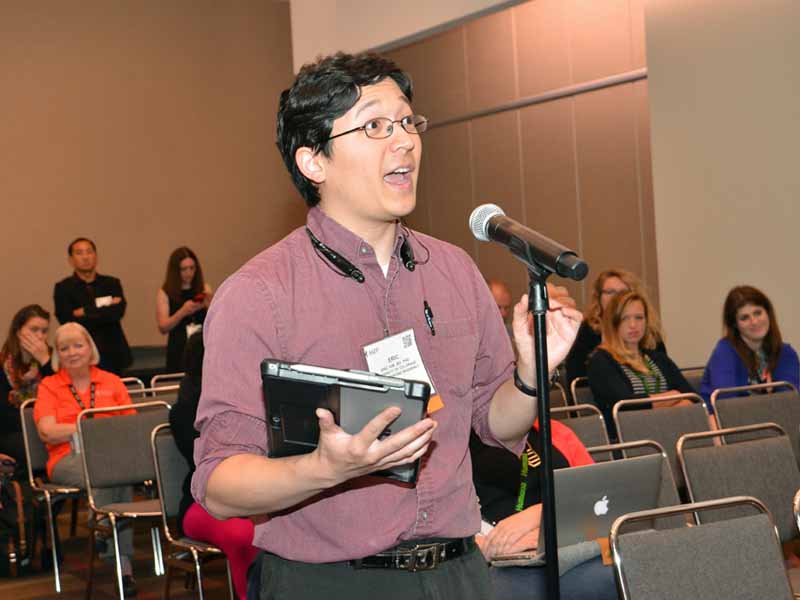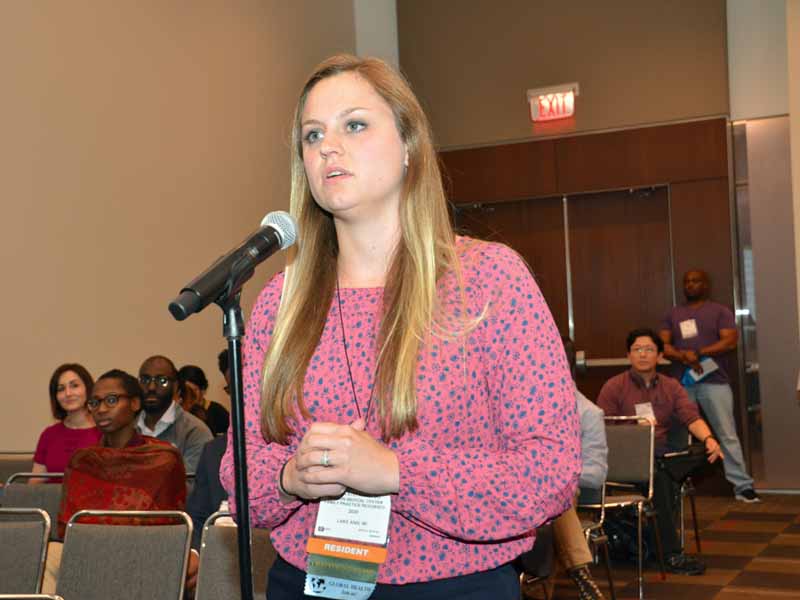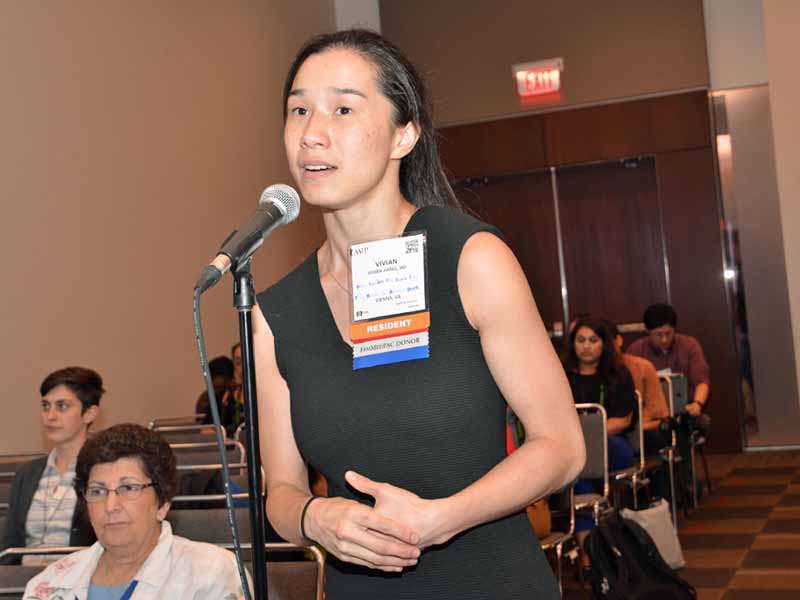Residents Tackle Tough Issues to Ensure Good Patient Care
August 08, 2018 01:14 pm Sheri Porter Kansas City, Mo. – Family medicine residents descended on the downtown convention center here Aug. 2-4 for the annual AAFP National Conference of Family Medicine Residents and Medical Students.
Some 1,200 residents and 1,800 students spent three days listening, learning and networking. In addition, a good chunk of the residents participated in the 2018 National Congress of Family Medicine Residents, where they crafted and discussed more than two dozen resolutions aimed at making patients healthier and ensuring physicians are equipped to do their jobs.
Reference committee hearings took place on Aug. 3, with voting the following day. Adopted resolutions will, according to the AAFP's policymaking process, be reviewed and referred, when applicable, to AAFP leaders for further action.
Here's a snapshot of testimony and action from this jam-packed event.
Electronic Health Records
Residents discussed and adopted two resolutions about electronic health records (EHRs). Eric Kim, M.D., Ph.D., of the University of Colorado Family Medicine Residency Program in Denver, authored a resolution that called for EHR optimization as a means of reducing physician burden and burnout.

In testimony before a reference committee during the 2018 National Congress of Family Medicine Residents, Eric Kim, M.D., Ph.D., of the University of Colorado Family Medicine Residency in Denver, tells committee members that it's important for family physicians to work with the people who design electronic health record technology.
Kim told the reference committee that technology development requires "participation by end users in every step of development. What if we participated in that role?" He said the AAFP should encourage family physicians to take part in development cycles and provide vendors with feedback by creating a way for members to "directly engage with the people who are responsible for many of the computer clicks we perform every day."
Delegates adopted a substitute resolution that asks the AAFP to amend its EHR policy to include member participation in improving technology. The resolution urges the AAFP to consider inviting EHR vendors to AAFP conferences to participate in member interest groups as a means of sharing physician recommendations with software developers.
Residents considered another resolution intended to integrate the cost of prescription drugs into the EHR.
Story Highlights
Morgan Rogers, M.D., of the Susquehanna Health Family Medicine Residency in Williamsport, Penn., said having the ability to see patients' out-of-pocket drugs costs "would help us understand patient compliance and whether or not they are actually picking up the drugs we are prescribing."
Reshma Ramachandran, M.D., M.P.P., of the Kaiser Permanente Southern California-Los Angeles Family Medicine Residency Program, wanted to include language asking for transparency on drug pricing to include costs related to research and development.
"We have a hepatitis C drug that costs around $96,000 for one formulation, $84,000 for another and $70,000 for a third," without any idea as to how manufacturers price their drugs, she said.
The resident congress adopted a substitute resolution that urges the AAFP to collaborate with other stakeholders to advocate integration of point-of-care clinical decision-support tools with EHRs to provide estimated out-of-pocket prescription costs via the EHR.
Women's Issues
Residents wrote and discussed measures addressing women's health issues, including one co-authored by Jessica Friedman, M.D., M.P.H., of the University of North Carolina at Chapel Hill Family Medicine Residency Program, that addresses the practice of shackling detained or incarcerated women while pregnant.
"The issue came to my attention earlier this year when it became known in the state of North Carolina that pregnant people who were incarcerated were being shackled during labor and delivery, as well as in the immediate postpartum period," said Friedman
She testified that both the AMA and American College of Obstetricians and Gynecologists already have policies against the shackling of prisoners in labor, as do at least 21 states.
Rebekah Rollston, M.D., M.P.H., of the Tufts University Family Medicine Residency Program-Cambridge Health Alliance in Malden, Mass., supported the resolution. "I was appalled when I saw this because I hadn't heard of it. It would be great if the AAFP could stand with the other organizations that were mentioned to oppose this very inhumane thing," she told the reference committee.
Residents adopted the resolution, which asks the AAFP to develop a position paper on the topic and to educate members about the AMA's model state legislation titled "Act to Prohibit the Shackling of Pregnant Prisoners."
Another resolution addressed the need for correctional institutions and detention facilities to recognize menstrual hygiene products as medical necessities.
Kaci Larsen, M.D., of the University of Missouri-Columbia Family Medicine Residency, co-authored the resolution.
"It was appalling to me when I realized that women who are incarcerated in state institutions have to pay for tampons and pads out of their commissary. There are plenty of studies out there that show women would have to work on average of 20-27 hours -- depending on what state they are in -- to buy one box of tampons."
Larsen added that the Federal Bureau of Prisons already supports the idea of free access to menstrual hygiene products.
Jiana Menendez, M.D., M .P.H., of the Mount Sinai Downtown Residency in Urban Family Medicine in New York, N.Y., related news of a similar shortage, albeit in another setting. "In my work in New York City, I've worked in a variety of homeless shelters where the of lack of access to these medical necessities has become immediately apparent.
"In one clinic in particular, I was working with a patient who kept coming in requesting socks -- one of the resources that was provided in the shelter. I finally realized that the reason she required so many socks was that she was using them as menstrual products," said Menendez.
During the congress on Saturday, residents adopted the resolution asking the AAFP to recognize the problem and to encourage chapters to advocate for access to unlimited free menstrual hygiene products including pads, tampons and clean underwear.
Pediatric Mental Health
Residents demonstrated compassion for their patients in several other resolutions, including one that asked the Academy to advocate that pediatric mental health funding be increased.
Kayla Stefanko, D.O., of the Munson Family Practice Residency in Traverse City, Mich., co-authored the resolution. She told the reference committee, "Access to quality mental health care is very limited -- especially in the pediatric population -- and this is not just an issue in rural areas or in Michigan. This is a nationwide issue."
Co-author Christopher LaJeunesse, M.D., of the Oakwood Annapolis Hospital Family Medicine Residency in Wayne, Mich., said his program was located just 20 minutes outside Detroit and has sent a lot of patients through a good, albeit frugal, local program mostly supported by grants.
"They don't spend the money unwisely, but the buildings are barely held together. They have great physicians, social workers and counselors onboard, but trying to get any of these kids into these services in a six-week time schedule is really a miracle," he said.

Kayla Stefanko, D.O., of the Munson Family Practice Residency in Traverse City, Mich., testifies in support of increased AAFP involvement in the funding of mental health services in the pediatric population.
Diana Huang, M.D., of the Swedish Family Medicine Residency Program at First Hill in Seattle, told a similar story. "In our experience in Washington, this is just as much an issue. As much as a third of the pediatric floor in our hospital can be taken up by patients who need inpatient placement for mental health, and there just aren't those facilities available, so they end up waiting in the hospital for weeks on end awaiting placement."
The resolution was extracted for further discussion, and, ultimately, the resident congress adopted an amended resolution that asks the AAFP to support and advocate for legislation to increase funding for pediatric mental health programs with the goal of increasing access to those services nationwide.
Family Medicine Research
Residents participating in their 2018 congress also showed strong interest in family medicine research. Vivian Jiang, M.D., completed her residency training in 2017 at the University of Rochester/Highland Hospital Family Medicine Residency Program in New York and is currently serving as the 2018 Family Medicine for America's Health(fmahealth.org) research fellow.
Jiang authored a resolution that would encourage building the family medicine research workforce.

Vivian Jiang, M.D., the 2018 Family Medicine for America's Health research fellow, tells reference committee members, "Research for primary care patients is best conducted in the outpatient setting."
"A lot of research is done in hospitals and is not conducted by family physicians; it's focused on patients that don't represent 99 percent of the people that we take care of. We need the family medicine perspective in practice transformation, payment reform, education and on how to take care of patients with multiple comorbidities. There's not a lot of incentives for family physicians to do this kind of research," said Jiang.
Joanna Edwards, M.D., of the Community Hospital East Family Medicine Residency in Indianapolis, spoke in support of the resolution.
"As family physicians, we are the faces of primary care in the United States. There are not a lot of other specialties outside of pediatrics that are providing this amount of primary care. If we are not engaged in research, if we are not engaged in policy and making our practices better through scientific research, then it might not get done."
The congress adopted a substitute resolution asking the AAFP to, among other things, create pilot funding opportunities and to create and sponsor a sustainable, interorganizational family medicine research engagement task force.
A second resolution, also authored by Jiang, asked for support for the AAFP's National Research Network (NRN). The congress agreed and adopted a substitute resolution that directed the AAFP to dedicate a stable annual funding stream through its budgeting process to support the NRN, and to create a liaison position for the NRN representative responsible for student/resident/fellow engagement on the AAFP Commission on Education -- or another commission -- for the purpose of elevating efforts to expand the family medicine research workforce.
The resident congress also adopted a number of other resolutions or substitute resolutions asking the AAFP to take action on various issues, including
- creating one resident and one student seat on the FamMedPAC Board of Directors;
- working with stakeholders to design systems that allow for medication assisted-treatment for opioid use disorder to be initiated in the hospital and continued when the patient is discharged to a skilled nursing facility;
- advocating to overturn the Risk Evaluation Mitigation Strategy (REMS) classification on mifepristone because that classification is not based on scientific evidence and limits the best evidence-based medical management of miscarriages, including access to abortion care;
- lobbying against legislative efforts to criminalize self-induced abortion; and
- opposing use of language that refers to "fetal personhood" in government policies and legislation.
Related AAFP News Coverage
National Conference Opening Event
Panelists Recommend Looking Back to Move Forward
(8/8/2018)
2018 National Conference
Students, Residents Elect New Leaders for the Coming Year
(8/4/2018)
Additional Resources
2018 National Conference: Day Three(wakelet.com)